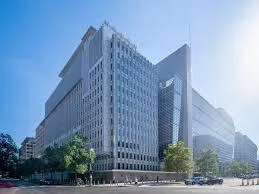Are we inviting the World Bank's interference or seeking genuine support?
Opinion

Later this year the World Bank Group will launch the second pilot edition of its B-READY report, a new benchmark for assessing global business climates.
Image: Wikipedia
Has the World Bank’s flagship business index already been hijacked — from a South African perspective — even before the country’s debut in the pilot phase?
Money, as Ayn Rand wrote, is the barometer of a society’s virtue.
In her 1957 novel Atlas Shrugged, Rand observed: “When you see that trading is done not by consent but by compulsion, when you see that to produce, you need permission from men who produce nothing, when money flows to those dealing in favors rather than goods — when corruption is rewarded and honesty becomes self-sacrifice — you may know your society is doomed.”
Nearly seven decades later, her words remain chillingly relevant.
Later this year (September–October 2025), the World Bank Group (WBG) will launch the second pilot edition of its Business Ready (B-READY) report, a new benchmark for assessing global business climates. South Africa is set to join the third pilot in 2026, alongside 184 economies, before the project’s full rollout in 2027.
B-READY, an evolution of the discontinued Doing Business survey, evaluates regulatory frameworks and public services affecting firms. For South Africa, the index focuses on 10 key areas — business entry, utilities, labour, financial services, taxation, dispute resolution, and more — spanning four departments: Employment and Labour; Finance; Small Business Development; and Trade, Industry, and Competition.
The WBG has already critiqued South Africa’s “hard regulations”, including BEE policies, local content rules, and collective bargaining, arguing they stifle implementation and breed corruption. A February 2025 WBG report, Driving Inclusive Growth in South Africa, also highlighted weak market competition as a critical flaw.
Notably, the report’s contributors included prominent South African economists and private-sector representatives — Tania Ajam, Haroon Bhorat, Mcebisi Jonas, and others. While the World Bank is a respected institution, its reports often reflect local biases rather than impartial Washington analysis. South African policymakers are well aware of this — and of attempts to influence policy through institutions and “experts” of perceived gravitas.
B-READY’s methodology relies on firm-level surveys and confidential expert input, raising questions about transparency. In a country with low internet penetration and a gatekeeping culture, how representative will these surveys be? The selection process — scouring LinkedIn, conferences, and embassy directories — hardly guarantees objectivity.
The Doing Business report’s demise in 2020 followed data manipulation scandals involving China, Saudi Arabia, and the UAE. Is South Africa immune to such interference? With competing economic agendas, disjointed governance, and external pressures (including from Trump-aligned figures), the risk of distortion is real.
Domestically, the DA is challenging labour laws in court, while AfriForum lobbies foreign governments against B-BBEE. Meanwhile, institutions such as the CIPC, Competition Commission, and SARS — though theoretically capable of enabling business — remain inefficient and disjointed.
Consider recent examples:
- CIPC’s mass deregistration of “non-compliant” companies, under the guise of FATF compliance, ignores South Africa’s unemployment crisis.
- Private-sector exploitation of undocumented workers (Uber, SPAR franchises) flouts labour and tax laws.
- Tshwane’s revenue crackdown exposes rampant illegal utility connections by businesses.
Will the World Bank’s surveys capture these realities? Or will its findings — like past reports — be skewed by advocacy masquerading as research? A 2005 evaluation of WBG research (led by Nobel laureate Angus Deaton) found that the Bank elevated favourable studies and ignored inconvenient ones, blurring the line between analysis and agenda.
South Africa doesn’t need external interference — it needs will. Regulatory bodies must function cohesively. Policies should enable, not strangle. And if B-READY is to be Rand’s “noble medium”, it must resist becoming another tool of coercion.
The question lingers: Is the World Bank’s index a genuine reform tool—or a new frontier of influence against South Africa?
* Makgwathane Mothapo is a marketing and communications practitioner.
** The views expressed here do not reflect those of the Sunday Independent, IOL, or Independent Media.
Get the real story on the go: Follow the Sunday Independent on WhatsApp.
Related Topics: